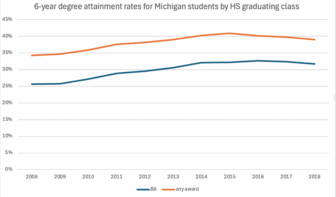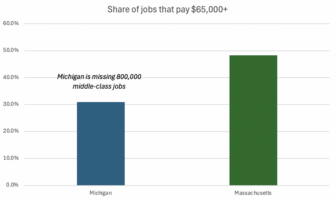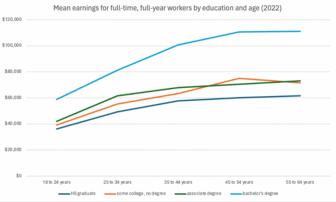I need to figure out how often to post this basic story. Because it is going to appear regularly in the press across the state, probably for years, mainly in our big metros. The reason to write about it a lot is that no one believes it. The dominant story is that there are no jobs here. So people are leaving Michigan. And you know the mantra: there are not enough jobs because we are a high tax, strong union state. The problem with that dominant story is that when it comes to high skill jobs it is wrong!
This time the news relates to the IT industry in metro Lansing. In a terrific article entitled “Fast-growing IT sector struggles to find qualified applicants” the Lansing State Journal details the job shortages at fast growing Liquid Web and other Lansing area IT companies. Because they can’t find enough workers in Lansing, Liquid Web has opened an office in Scottsdale, Arizona. Yes that is right: the company moving to where the workers are, not the other way around.
So here is the correct basic story. Even with double digit unemployment here, in skilled occupations Michigan has more jobs than workers. And the shortage is going to increase as the economy expands. In low skill occupations we have more workers than jobs. And that too is not going away anytime soon. As a country we are moving to an economy where 30-35% of the jobs are going to require four-year degree type skills and only 28% of Americans have a four-year degree. In Michigan it is 24.5%. There will also be shortages in technical occupations requiring the equivalent of a two-year degree or occupational certificate in some occupations.
Part of Michigan’s challenge is not enough of us get degrees. But another part is that too many who get degrees here move away after college and we do not do very well in attracting talent from elsewhere. Given the labor shortages, it is clear that it is more than just no jobs that are causing the net out migration of talent. And when companies can’t find enough workers, they leave.
Why this matters so much is most of the job growth in America has been, is, and will continue to be centered in knowledge-based enterprises. Those that require the highest proportion of high skill workers. So for Michigan to grow its economy and its income we need to focus on what matters most to the high wage, growing sector of the American economy. And that is talent. Since those jobs are concentrating across the country in big metros we need to particularly pay attention to metro Detroit, Grand Rapids and Lansing. If they don’t work the state cannot be prosperous.
Our presentation tag line is We need to get younger and better educated or we get poorer. We had better learn that lesson. If we don’t make preparing, retaining and attracting talent the priority we are going to continue to lag the country.






